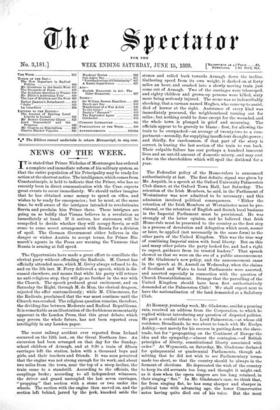At Romsey, yesterday week, Mr. Gladstone, amidst a pouring rain,
received an address from the Corporation, to which he replied without introducing any question of disputed politics. He paid a cordial tribute to Lord Palmerston,—at whose old residence, Broadlands, he was about to lunch with Mr. Evelyn Ashley,—not merely for his success in putting down the slave- trade, but for "propagating on the Continent of Europe the idea and the sympathy,—almost the contagion,—of British principles of liberty, constitutional liberty associated with order." At Weymouth, on Saturday, Mr. Gladstone declared for quinquennial or quadrennial Parliaments, though ad- mitting that he did not wish to see Parliamentary terms made too short, so that the country should be always in the ferment of elections. He deprecated the wish of the country to keep its old servants too long, and thought it might end, as it does when the opera singers are too long retained, in their singing "flat." In Mr. Gladstone's case, we think that, far from singing flat, he has sung sharper and sharper in political tone with advancing age, the lower Conservative notes having quite died out of his voice. But the most
remarkable of his utterances at Weymouth was the state- ment (made on what authority?) that the Parnellite Members had "exerted themselves with laudable and untiring per- sistency to condemn, thwart, and put down by every means in their power crime and outrage in Ireland ;" and that their reward had been that twenty-three or twenty-five had been put in prison by the Government. In Mr. Gladstone's opinion, then, driving tenants even against their will into joining the "Plan of Campaign," which is an illegal and fraudulent combination, is putting down crime by every means in a man's power. That seems to us singing very much above pitch indeed.



































